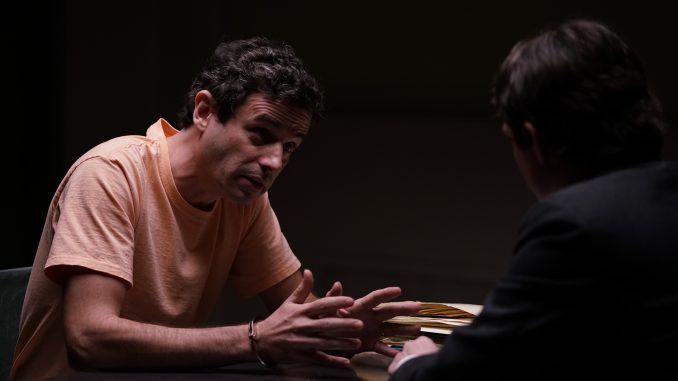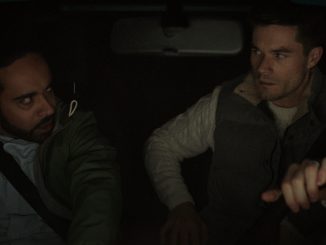
No Man of God tells the story of Ted Bundy and his relationship with FBI agent Bill Hagmaier of the Behaviour Analysis Unit (BAU). Hagmaier befriends Bundy over the years, ultimately getting Bundy to confess to multiple crimes. I had mixed feelings as I watched this film, unsure of what I was really seeing. I expect this will be a shorter review than usual as the film is largely a dramatization of the events that happened and there’s little room to add commentary around that.
There are a couple of things that I do want to discuss, but first let’s talk discuss the stars of the film, Luke Kirby (Bundy) and Elijah Wood (Hagmaier). I last saw Wood in I Don’t Feel At Home in This World Anymore and while I wasn’t impressed by the film, I was blown away by his performance. Similarly, in this film, Wood does an amazing job in his role. The banter between Wood and Kirby keeps you on the edge of your seat for the entire film. You know how it is going to end, but they make you feel like you don’t really know… like something unexpected is going to happen. Kirby, on the other hand, felt like an unknown to me… even though he has a substantial IMDB page. The only movie I recognized him from was 2011’s Take This Waltz. Kirby did a fantastic job as Bundy… almost too good as he was quite charming at times, although I guess that’s who Bundy was.
NO MAN OF GOD is largely about Bill’s struggle to understand what makes him different from Ted, and his dawning realization that they’re actually not that different. At the same time we are showing Bundy in a way that has never been seen before—the un-glorified, insecure, narcissist. This is not the rockstar-Bundy that everyone likes to talk about, this is the real man with all his pathetic neediness.
Amber Sealey, director
That brings me to the first of two things that I want to discuss. According to the director, Amber Sealey, in the statement above, the goal was to show us Bundy’s “pathetic neediness.” I don’t feel like this was accomplished. It was, in fact, one of the reasons why I didn’t rate this movie higher. Based on the performances, it could have easily been a 4-star film, but I felt like Bundy was glorified in the film. There were several times while watching the film that I felt he was being shown in a positive light and I was unhappy with that characterization. I find it interesting that my view of the character on the screen was so disconnected from the vision that Sealey had. This is a film where I would definitely watch the director’s commentary in an attempt to figure out where the disconnect is.
It was crucial to me to have the victims represented in some way that was neither saccharine nor simplistic. There was only one female character in the script, so I decided to use what we had available to us: the women in the world around them. I was also certain that this film would not include any reenactment of Bundy’s crimes, everyone understands the violence his victims endured. But we can’t ever forget that this movie largely deals with two men in a room talking about the excessively violent rape and murder of upwards of 30 women — women who were targeted because of their socialized and internalized nature to be nice and helpful to a person in need. These victims cannot speak for themselves, and this is not meant to be their story. But they should not be forgotten in the telling of Bill’s story — were it not for them and what they went through, Bill would not be sitting opposite Ted. These women get to watch Bill and Ted for us, they get to show us how uncomfortable it is for them (us) to be surrounded by all of this violence against women.
Amber Sealey, director
This time, I agree with Sealey. I thought the use of the women in the film to portray emotion and give a voice to those without a voice via their actions and reactions was brilliant. There’s one moment where a conversation is occurring and the camera slowly closes on the face of a actor that would otherwise be a background character. The emotion in her face is enough to move the viewer in a profound way. At the moment that the scene occurs, I was completely drawn in and unaware of my surroundings, but as we watch her react, I’m pulled out of the moment and slapped with a wake-up call. It was incredibly powerful and was, without a doubt, the most memorable scene in the film.
At the end of the day, the film is good and I recommend seeing it. I wish Bundy appeared as more of a villain, but I guess that wasn’t the story… the story was focused more on Hagmaier and how the conversations affected him. If you’re interested in seeing a dramatization of that relationship, then you should definitely check this film out.
No Man of God was released in theatres, on demand and digital on August 27.
No Man of God
Overall
3.5-
Overall



